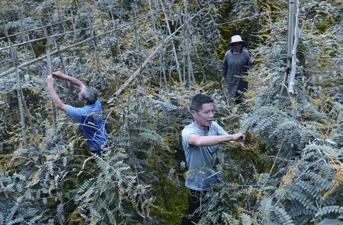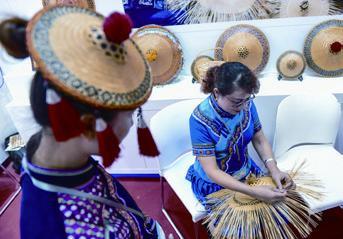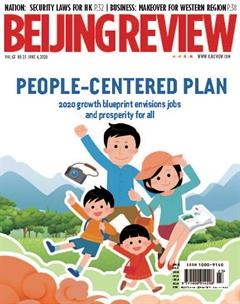Paving the Way
By Yuan Yuan & Li Nan


Huang Bingfeng came to Beijing as a dep- uty to the National Peoples Congress(NPC) annual meeting with good news from his hometown. On May 9, Huanjiang Maonan Autonomous County in Guangxi Zhuang Autonomous Region shook off poverty, adding Maonan to the list of ethnic groups in the country to beat back poverty.
Some Maonan people wrote a letter to President Xi Jinping, sharing the joy of poverty elimination and expressing their determination to continue to build their hometown. Xi replied to the letter, encouraging them to take this as a new starting point for a better life.
Since China launched its poverty elimination campaign, many ethnic minority groups have shaken off poverty. However, since many of these ethnic minorities are located in remote areas with poor transportation, the battle against poverty requires a greater effort.
Hope for karst area
Residing in a karst and mountainous area in south China, the Maonans, with a population of about 100,000, have been inconspicuous for a long time. Huanjiang, the only Maonan autonomous county, was established in 1987. Back then, the poverty rate was as high as 77 percent in the county, Huang told Xinhua News Agency.
Wei Zhenling, Deputy Procurator General of Liuzhou Municipal Peoples Procuratorate in Guangxi, is the only Maonan member in the National Committee of the Chinese Peoples Political Consultative Conference National Committee. Wei was 14 years old when Huanjiang was set up.
“Village and town roads used to be winding and bumpy,” Wei told local media in Guangxi.“The mountains made transportation very diffi cult and it was extremely hard for us to get out of there.”
Wei left her hometown to enroll in Sun Yat-sen University in Guangzhou, capital city of Guangdong Province in south China. When she told people she was Maonan, most people would say they had never heard of the ethnic minority group.
“Being an ethnic group with such a small population, living in isolated mountains, it was hard for us to be noticed,” Wei said. This largely changed after the government invested more in her hometown, especially in recent years. Now all towns and most villages are connected by asphalt roads.
But for Huang, this is not enough. The absence of an expressway has long been the largest bottleneck for the development of Huanjiang. The karst scenery there is spectacular and is a World Natural Heritage Site along with six other karst areas in south China. But due to the inconvenient transportation, the number of tourists in the Huanjiang karst area is signifi cantly smaller than in the other areas. For years, Huanjiangs economy has been the least developed in Guangxi.
Huanjiang therefore adopted various measures in its campaign against poverty. Offi cials in different local departments were assigned to work in villages. They lived with villagers, learned about their needs and difficulties and helped them to develop their own industries such as breeding silkworms, cattle and hogs.
Qin Liu, 27, who was working in the meteorological bureau in Huanjiang, took the initiative to go to Guanan Village in May 2018. She visited every household, listening to their issues and taking detailed notes on the conditions of every household.

She then applied for 100,000 yuan($14,000) in supportive funds from the government and set up a cooperative to raise ducks. To explore distribution channels for the ducks, Qin went to fairs in bigger cities and quickly opened up the market. Meanwhile, the local government helped residents living in extremely remote areas resettle in Huanjiang.
Tan Sumiao, who moved into her new house in the countys relocation site from a faroff township, said she spent only 10,000 yuan($1,400) for the new house. “I lived in a very old house in the township. It was dark even in the daytime,” she said, “The new one is bright and sunny. I never dreamed of living in a house like this before.”
After relocation, the local government took steps to fi nd jobs for the relocated people. She was hired by a factory producing electronics and earns about 2,000 yuan ($279) a month.
“I didnt have any savings before. My family depended only on the farmland for food. But now, my husband is working in a property management company and also earns about 2,000 yuan a month,” Tan said.
“The net income of Maonan people increased from 3,570 yuan ($500) in 2015 to 11,756 yuan ($1,640) in 2019, while the fiscal revenue of the local county government increased from 331 million yuan ($46 million) in 2015 to 650 million yuan ($90 million) in 2019,”Huang told Beijing Review.
Unique features
Maonan tradition and folk culture has been skillfully preserved while the county forged ahead with poverty alleviation. Since the Maonans do not have a writing system, they pass down their legendary stories and customs through dance.The Nuo dance, or Feitao in the Maonan language, is the traditional theatrical performance of worship. In 2008, Feitao was included in Chinas national intangible cultural heritage list and has been staged in many countries including Germany, Thailand and Japan.

